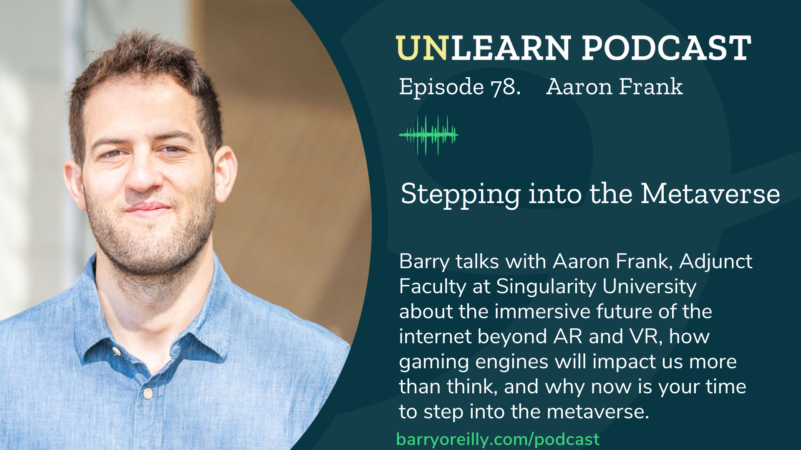Aaron Frank is Adjunct Faculty at Singularity University, where he routinely advises large companies, startups, and governments on trends related to augmented and virtual reality and the use of virtual environments. Organizations like Twitter and FC Barcelona have benefited from his services. He is a researcher and writer whose articles have appeared in Vice, Wired, Forbes and VentureBeat. Aaron joins Barry O’Reilly in this week’s show to define the metaverse, and how to leverage it in your own business.
The First Foray
Aaron talks about his thoughts when he first encountered immersive virtual reality headsets. He was tasked with doing an impromptu presentation for foreign investors and unfortunately didn’t execute it well. When he put on the VR headset, he thought about recreating the environment of the presentation as a sort of “public speaking simulator.” He went on to build a very basic version of it and was surprised by how true-to-life it felt. That was when he realized that VR wasn’t just for gaming. “This [was] a new way for people to experience anything,” he shares. “[It] can replicate almost any experience.” [Listen from 2:19]
Behind the Scenes of AR and VR
The internet of the future will be immersive. Barry asks Aaron to describe his experience diving into the metaverse. “It’s important to make a distinction between augmented and virtual reality technologies,” Aaron says, “because those terms typically refer to the kinds of interfaces [necessary for each.]” An interface is a way of engaging with the digital environment, similar to how we use a mouse and a keyboard to operate our computers the way we want to. Aaron predicts that in the near future, however, we’ll rely less and less on a mouse and keyboard; we’ll be using VR headsets and our arms. He defines the term metaverse. “What people are referring to when they say metaverse is an evolution of life, online. It’s a new type of internet; in most cases, if you replace the word metaverse with internet, the sentence should mean the same thing,” he claims. “The metaverse is directionally pointing to a variety of changes coming to the internet; those changes are largely about an internet that’s built in 3D immersive spaces where you inhabit them as an avatar in an online virtual environment.” [Listen from 8:06]
Manipulating the Metaverse
The metaverse allows you to manipulate physical space in a virtual environment and mimic social behavior to recreate real-life experiences. People are using the metaverse to train employees, Barry shares. They are put to the test in stressful situations to observe how well they respond as a team; from speaking individually to escape rooms that require cooperation and serve as a fun activity. Advancements in the metaverse are happening so quickly, he adds. “It doesn’t have to be this ‘ready player one’ experience where you put on the headset and can’t tell whether you’re in the real world or not,” Barry comments. “It can just be blocky characters.” Aaron talks about how you can switch virtual environments to simulate physical spaces, such as seating arrangements at meetings. With a click of a button, you can go from a traditional conference lecture, to paired partner tables, to a four-person conference table. Another benefit of using an avatar based virtual environment is its ability to replicate social behaviors in a way that’s impossible to do on Zoom. [Listen from 17:59]
Why Game Engines are Serious Business
Aaron is not advocating for a future immersed in VR. “It’s worth remembering that these are valuable tools, and it’s worth understanding what they are used for… they’re not meant to – and should not be used to – replace physical reality in any way,” he affirms. He debunks some misconceptions about the metaverse and proposes a new way of thinking about it. The metaverse is being built by game developers using game engines, but the term game is misleading; game engines are software tools that developers use to build virtual environments. They’re largely used in video games, but they are some of the most important and consequential technologies of the next decade. Game engines are now starting to mediate entire industries outside of traditional video games, Aaron remarks. [Listen from 24:33]
The Truth About Gaming
There’s a lot more to gaming than meets the eye, Barry points out. People don’t really know how much thought goes into things like simulation, incentive design, teaching people new skills, and leveling them up on their journey to mastery. “[In] any game you join, the experience is all about building skills,” he says. He talks about the skills that games teach you, like rapid experimentation, risk taking, and teamwork. “[Rather than] meaning fun and childish play, games are about coordination, incentive design and skills development.” He and Aaron explore the concept of safe-to-fail environments. [Listen from 31:17]
















